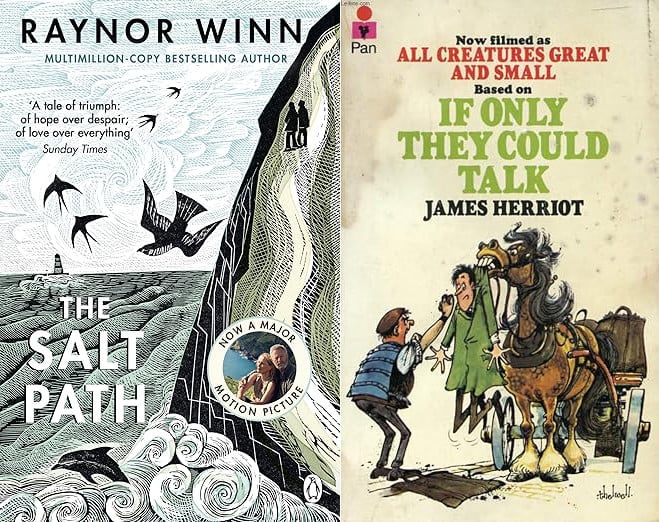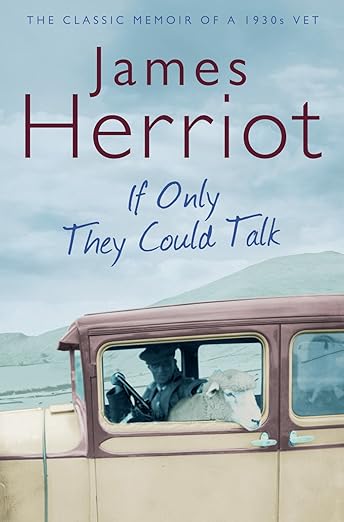How True Does A Memoir Have To Be?
How true did The Salt Path have to be to qualify as a memoir, and where does James Herriot fit into this discussion?

A memoir is any nonfiction narrative writing based on the author's personal memories. The assertions made in the work are thus understood to be factual. While memoir has historically been defined as a subcategory of biography or autobiography since the late 20th century, the genre is differentiated in form, presenting a narrowed focus, usually a particular time phase in someone's life or career. — Wikipedia.
I confess that I’d been utterly unaware of Raynor Winn’s 2018 memoir The Salt Path until I started seeing adverts for the recent film adaptation starring Gillian Anderson, and even then, I was only vaguely aware of it until the Observer lit the blue touch paper on their investigation into the underlying veracity of the book, and found it very much lacking. If you haven’t read the Observer’s piece, read it now (at the link I’ve just given), firstly because it’s an incredible piece, and secondly because I don’t want to talk here about the allegations. Instead, I want to talk more generally about how much truth we do, and should, expect from memoirs, and whether our attitudes in this area have changed over the years.
Because this all got me thinking about the best-selling memoirs of Yourshire vet James Herriot. What would you say if I provided the following blurb for the first book in the series, If Only They Could Talk?
If Only They Could Talk tells the story of James Herriot, a young Scottish vet fresh out of university, who gets a job in the Yorkshire Dales in 1937. In the last halcyon days of peace before the coming world war, he learns his trade and courts his future wife, a farmer’s daughter, under the stern but benevolent eye of his employer and mentor Siegfried Farnon.
About the author:
Alf Wight graduated as a vet in December 1939. After a spell working at a surgery in Sunderland, in July 1940 he accepted a job in Thirsk (located midway between the Yorkshire Dales and the North York Moors) to run the practice on behalf of its owner, Donald Sinclair, who had joined the RAF. As the Battle of Britain raged two hundred miles to the south of him, he ran the practise single-handedly while courting his future wife, who worked as a secretary.
Now if you read this, you might come to the not unreasonable conclusion that If Only They Could Talk was a work of autobiographical fiction, rather than a memoir.
Autobiographical fiction is any work of fiction that is based on the real life events of the author. Autobiographical fiction is based on fact—but, importantly, not bound by fact. — Writers.com
And it might therefore interest you to note the following fact (and when I say “interest you to note” I should say that the fact I’m about to relay to you totally blew my mind when I first read it).
If Only They Could Talk was originally written in the third-person, and was changed to first-person only after this change was suggested by a reader at a publisher who was looking over the original draft.
To me, that fact alone proves the point that this was written as autobiographical fiction (or even, to be frank, semi-autobiographical fiction), and was later changed to first person, published with an author’s pseudonym that matched the protagonist’s name, and marketed as a memoir.
And they are still marketed as memoirs. The latest version describes If Only They Could Talk as “The classic memoir of a 1930s vet”).

Now you could ask if any of this matters? After all, Alf Wright never embezzled money or lied about medical diagnoses (the two main allegations against Raynor Winn), was well-liked by all, and more importantly, he was a brave man who in November 1942 joined the RAF as a volunteer to train as a pilot. (When as a member of a reserved occupation, he didn’t need to go anywhere).
And in a sense, no it doesn’t matter. But when I read those books in the early 1980s, as a young teenager, I believed them to be true. Completely true, other than very reasonable changes of names to protect privacy. When, in later life, I found out that they weren’t quite true, or at least they weren’t quite true according to the meaning of the word truth that I, a man who would later be diagnosed as autistic, was using… well it sort of discombobulated me.
(And if I was discombobulated by the “revelations” about James Herriot, God alone knows how people who were personally invested in The Salt Path must be feeling right now).
But I think the world has changed. I think people now are more demanding of authenticity, and facts are harder to suppress. If Alf Wright were being published for the first time now, he would be expected to be on social media. Amateur bloggers would be digging into his past, going through online local newspaper articles. They’d be pulling apart the differences between his memoir and his social media history. They’d be pointing out the fact that he didn’t actually practice in the Yorkshire Dales.
It’s long been said that travelogue as a genre is heavily fictionalised. Truth doesn’t always write good stories. Truth goes down blind alleys. It rambles. A gun can be mounted above a fireplace and never actually be used to kill someone. If you go on a walk from John o’Groats to Lands End to find yourself, you might inconveniently find yourself halfway through the walk, in a Travelodge just outside of Birmingham, rather than just at your journey’s end as the Atlantic Ocean comes into view.
The temptation to write the well-plotted story that could have happened, rather than the more confused one that did, must be overwhelming. But deep down in my soul, I don’t like it. Fiction is fiction and memoir is memoir. If I’m reading a supposedly true story, I want it to be true.
I just think that the actual truth has a certain authenticity.